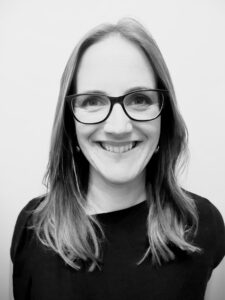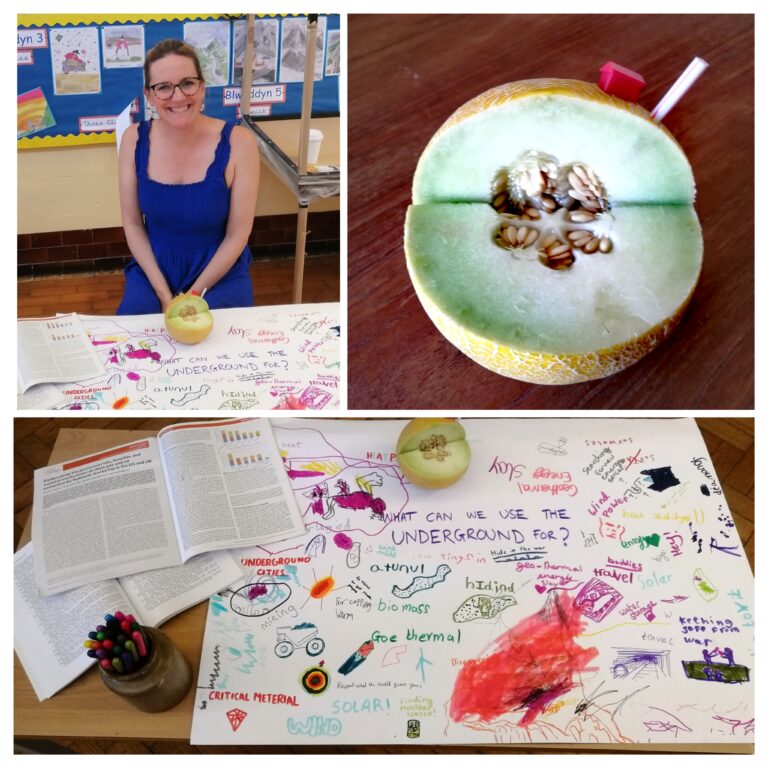Meet the scientist: Merryn Thomas
In this edition of Meet the Scientist we interview Merryn Thomas. She is a researcher at the University of Exeter, where she focuses her research on the societal engagement around UTES.

Can you introduce yourself?
My name is Merryn Thomas and I am from Plymouth, in the southwest of the UK. I now live in Swansea, Wales, with my family. I work at the University of Exeter (based on the Penryn Campus in Cornwall, England). I’m working with Dr. Iain Soutar and Prof. Patrick Devine Wright at Exeter, as well as Dr. Mel Rohse and Dr. Madeleine Kechagia at Anglia Ruskin University, on the societal engagement package of PUSH-IT.
My interdisciplinary research draws on geography, psychology, and social science and I have a longstanding interest in using quantitative, qualitative, and creative methods to engage diverse publics with environmental issues. I hold a BA in Geography (University of Oxford), MSc in the Science of Natural Hazards (University of Bristol) and PhD in Psychology (Cardiff University). I completed my PhD in 2013 using a mixed-methods, mental-models approach to explore public and expert perceptions of sea-level change. Since then I’ve worked on a variety of public perceptions and engagement projects. These have included an NSF-funded project (with Cardiff University and UCSB Santa Barbara) that used deliberative workshops and roleplay to explore public perceptions of shale gas development in the UK and USA. Then, I worked on NERC-funded CoastWEB, and for that used in-depth mobile interviews and mapping to better understand the connections between coastal habitats and human health and wellbeing.
From 2020, I worked with the Freshwater Interdisciplinary Research and Engagement (FIRE) Lab in Biosciences at Swansea University, using various creative methods, stakeholder interviews and surveys to connect and explore people’s relationships with freshwater environments. I then joined The Centre for Ageing and Dementia Research in September 2022, where I led the UKRI funded project, ‘Understanding Older people’s PerspecTives and Imaginaries of Climate change (OPTIC)’. This involved intergenerational workshops and events to explore understandings and visions of climate change, which were then made into a bilingual comic book (www.climatecomic.co.uk). We have since made an intergenerational activity book, based on the comic, to stimulate climate conversations between young and old. This can also be found at www.climatecomic.co.uk.
What exactly do you research?
I am part of the societal engagement team within the PUSH-IT project. This involves two main strands. The first is exploring public perceptions of and attitudes towards underground thermal energy storage. We have just received the results of a large quantitative survey of 5800 individuals (n=1000 in each country and n=300 within 20km of each site). We are now planning qualitative focus groups to delve deeper with smaller samples in each location. The second strand is developing engagement practice with partners at each site. For this we hold bimonthly meetings with site partners, and are carrying out baseline and follow up interviews and surveys to explore partners’ progress with and understandings of societal engagement. To assist with engagement activities across the sites, we are also co-creating a catalogue of engagement practice in collaboration with site partners.
Why have you chosen this field of science?
My MSc involved a lot of computer modelling of sea-level rise and coastal flooding. As I started to calibrate the models with local residents, I became increasingly interested in how they engaged with and understood sea-level change, particularly their local knowledge. After working in television and photography for a few years, I came across a PhD offered at Cardiff University that would explore public perceptions of sea-level rise. I jumped at the chance. This was my first introduction to environmental psychology. The PhD was supervised by psychologists (prof Nick Pidgeon and prof Lorraine Whitmarsh) and a geographer (Dr. Rhoda Ballinger) and set me on a path for my interdisciplinary work since then, which has always combined my love of physical geography and my interest in people! I’ve always been amazed by Planet Earth. It’s a good day when I hear from a friend that their child has gone home from a playdate talking about volcanoes or aquifer thermal energy storage!!

What do you want to accomplish as a scientist?
I want to make at least a little bit of difference to climate change. This might be through encouraging older and younger people to be inspired to take adaptation or mitigation actions through intergenerational dialogue, it might be inspiring the next generation of scientists to work on new energy technologies, empowering people to have their voice heard in environmental issues that affect them, or facilitating communities to imagine and shape zero carbon futures.
Why is it necessary to do this research?
Societal engagement is essential for energy transitions in order to ensure they are ‘fair, acceptable and, ultimately, successful’ (Soutar et al 2022) – I can’t really put it better than that. Engagement is not only the right thing to do (this is the ‘normative’ argument) and essential for societal support, but it can also lead to better decisions through properly addressing communities’ hopes, fears, preferences, and of course their local and experiential knowledges.
What is the work that needs to be done in the future in this field?
The PUSH-IT project is refreshing in the way that societal engagement is a core part of the work. Especially important is the conceptualisation of engagement in PUSH-IT as an evolving practice, and a process of experimentation and learning between partners. In future I’d like to see more projects like this, and for them to go still further with their commitment to societal engagement – bringing communities in at the very beginning of projects to help shape them, and building upon the engagement practices being developed within PUSH-IT.
Do you have any tips for people who want to become a scientist like you?
Never lose the wonder 😊

PUSH-IT is a project funded by the European Union’s Horizon Europe research and innovation programme under grant agreement No 101096566.
Funded by the European Union. Views and opinions expressed are however those of the author(s) only and do not necessarily reflect those of the European Union. Neither the European Union nor the granting authority can be held responsible for them.
